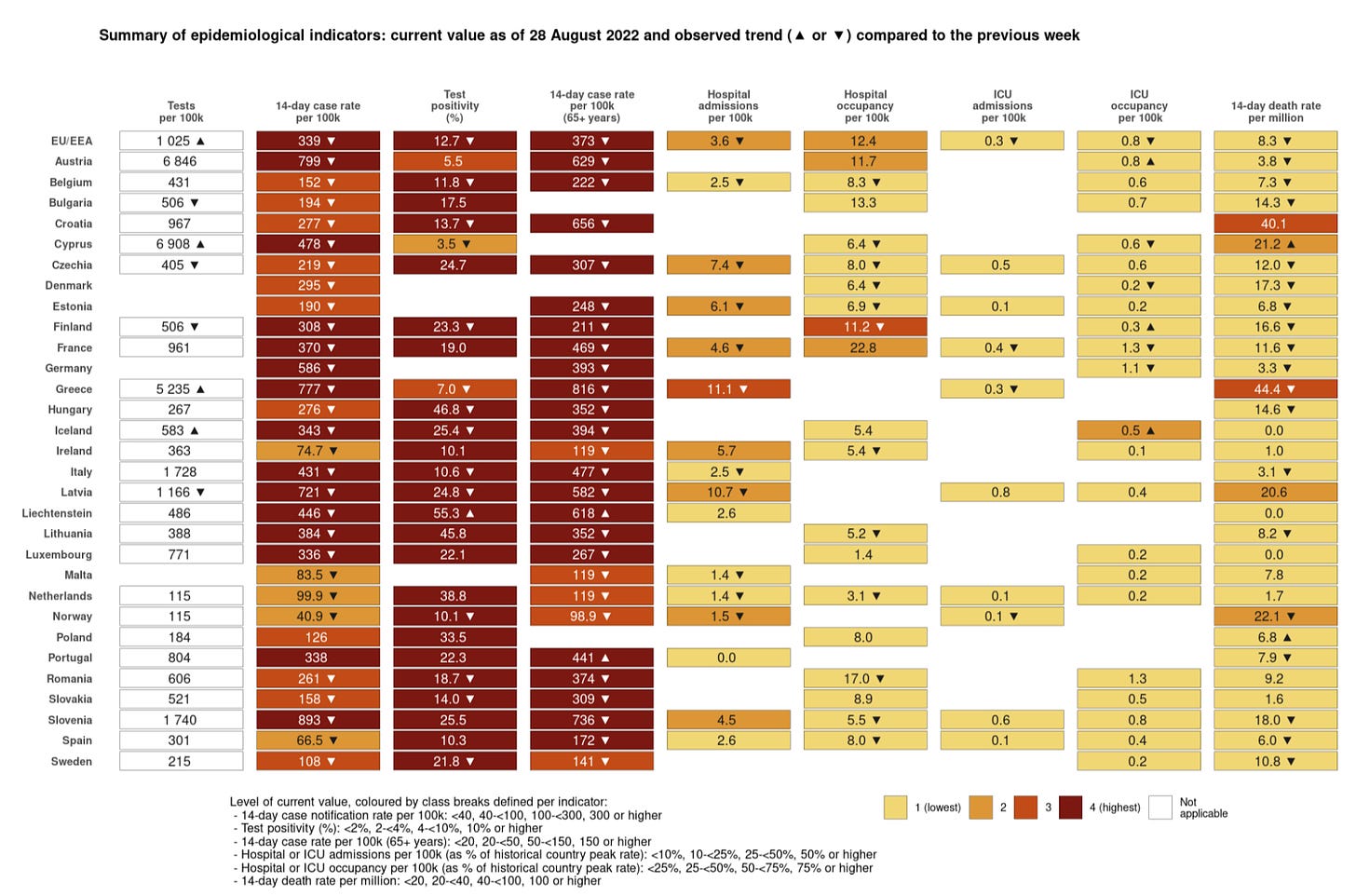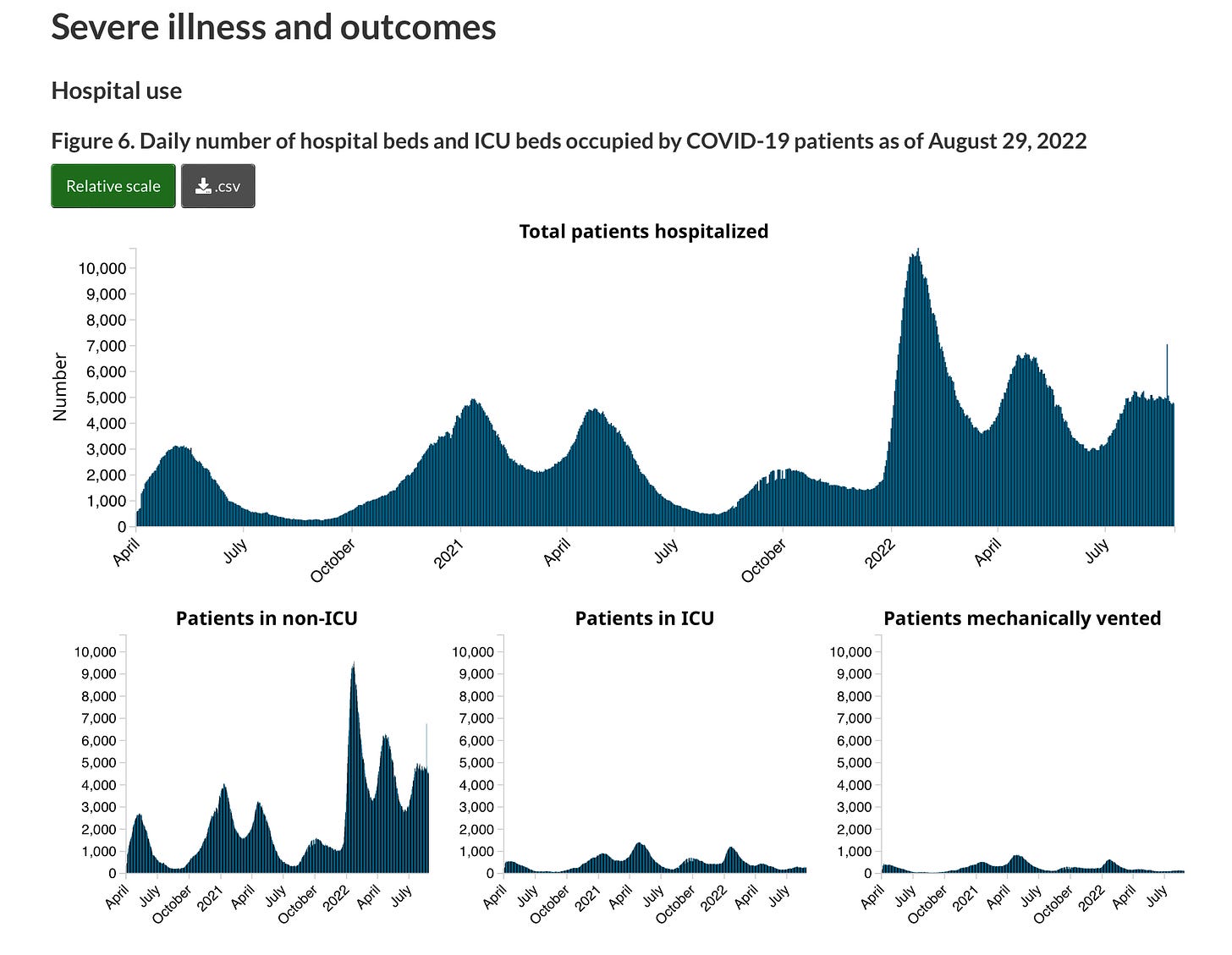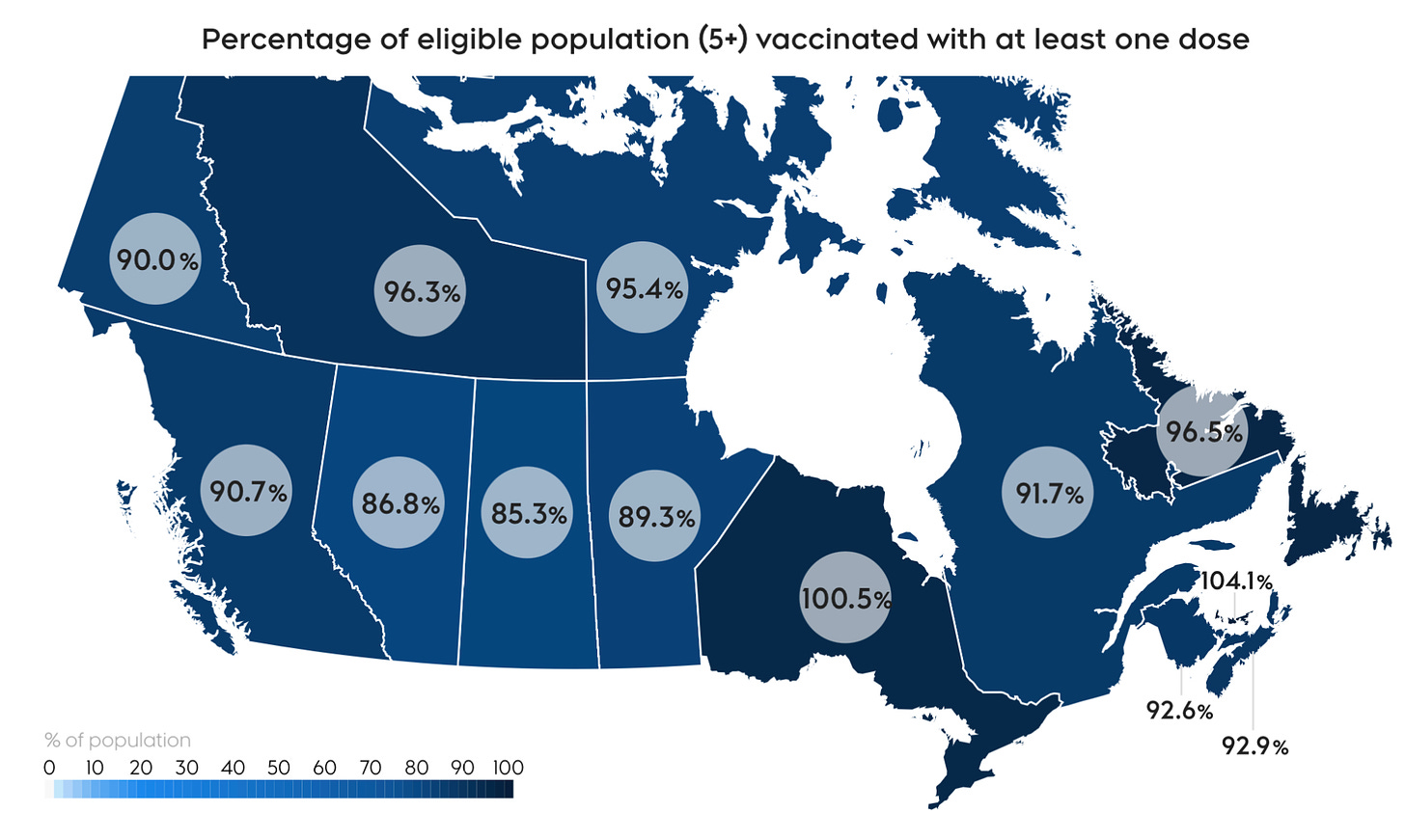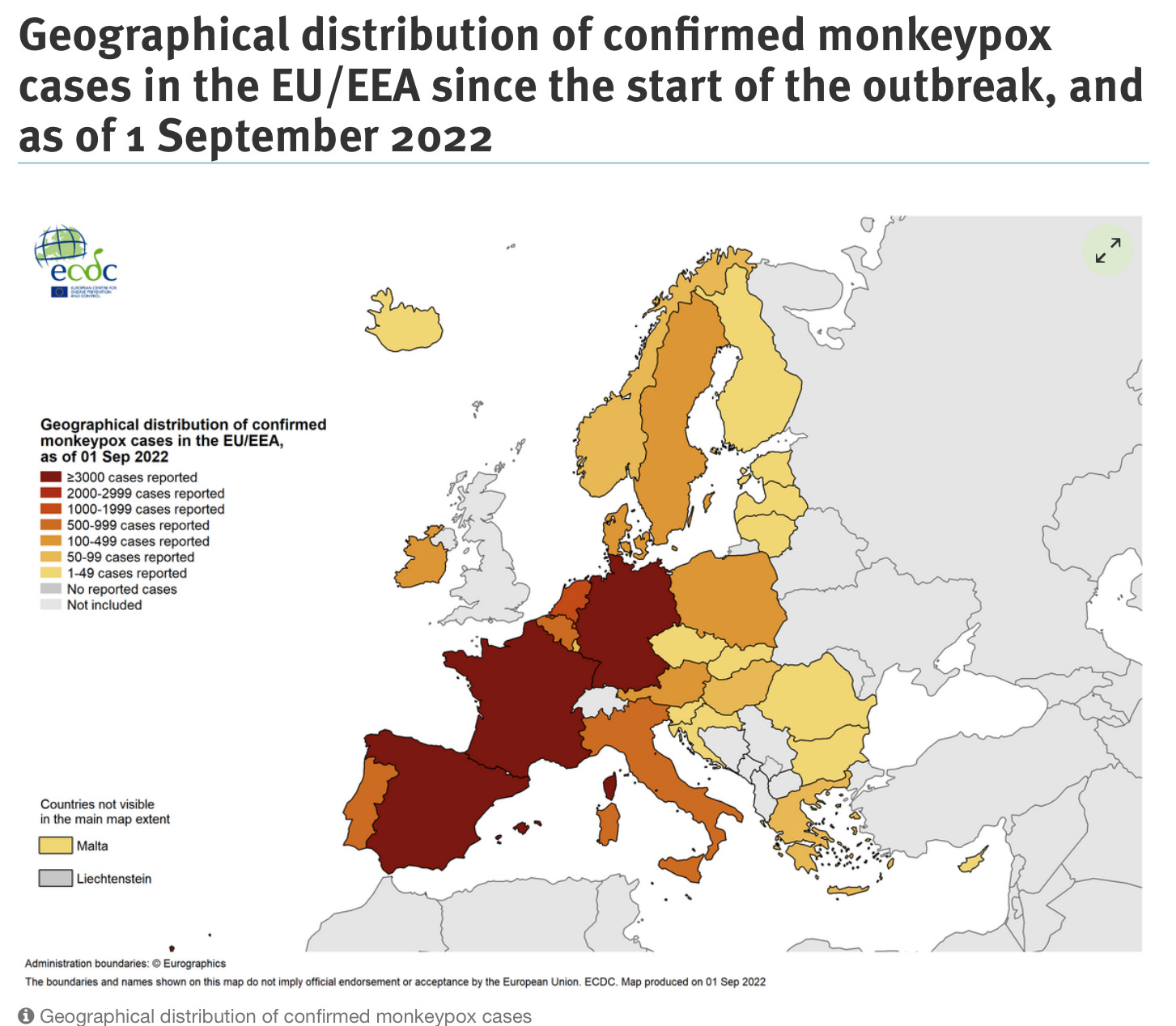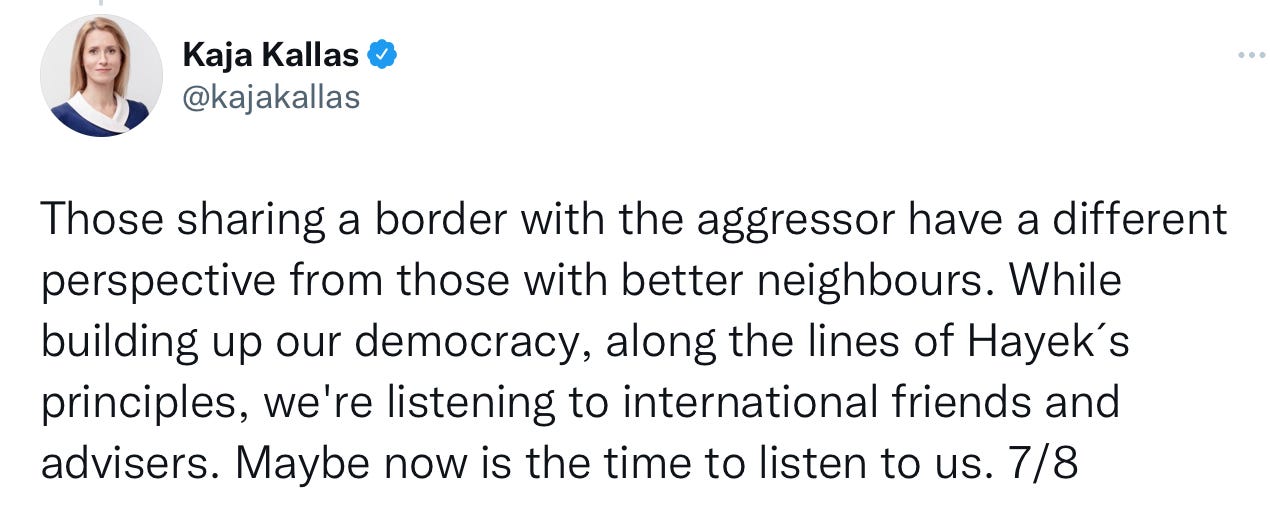Monday Morning News & Notes
BA.5 wave in retreat across Europe. The energy crisis tightens its grip.
🦠Pandemic🦠
🇪🇺🦠
The BA.5-driven COVID wave appears to have peaked and is now ebbing across Europe. The latest weekly assessment from the European Centre for Disease Prevention and Control says COVID cases have fallen by14% week to week. This is the 6th straight week case numbers (underreported) have been in decline. Overall, coronavirus activity in the E.U. is sitting at about 9% of the pandemic’s maximum.
Among vulnerable seniors in Europe, the ECDC says numbers are also in retreat, with the exception of Liechtenstein and Portugal, where infections were increasing among those 65 years old and older.
“The wave driven largely by BA.5 that was previously observed to be moving from west to east across the EU/EEA appears to have passed its peak in all countries, with no countries reporting increases in in their case notification rates.”
Of the 28 countries reporting data on hospital and ICU admissions, only three registered an increase in numbers in one or both categories compared to the previous week. The ECDC says intensive care levels across the European Union and the greater European Economic Area are between 1% to 23% of maximum. The one exception is Iceland, where ICU capacity is over 25%.
The 14 day pandemic death rate per million population continues to ebb for a 4th straight week as it fell from 12.1 to 8.3. Just Cyprus and Poland are reporting increasing numbers of coronavirus deaths.
On the vaccination front, 53.6% of the total population across Europe have two doses and a booster shot. Among seniors 60 years old and older, the uptake is 83.8%. Just 6.1% of the total population has had a 4th dose.
Among the mere 11 countries who are testing and sequencing positive test results in numbers high enough to get reliable data, 99.1% of all positive test results came back as the BA.4 or BA.5 Omicron sub-variants. There were just 38 infections (0.3%) for the BA.2.75 variant as it continues to spin its wheels in Europe.
The ECDC is forecasting that infection numbers and pandemic deaths will continue to fall over the next two weeks, while COVID hospitalizations will increase.
“It should be noted that forecasts of cases are considered to be increasingly unreliable due to changes in testing criteria and reporting procedures. All current forecasts, in particular case forecasts, should be treated with caution.”
🇩🇰
Danish hospitals seem to be making headway in clearing a backlog of delayed and postponed surgical procedures built up during the last two years of the COVID pandemic.
The Danish Ministry of Health says the rate of surgical procedures is pretty close to 2019 pre-pandemic levels.
Back in February, the Danish government reached a deal with the regions to unleash money and a strategy to reduce the treatment backlog and return waiting times to “normal” by the end of this year.
Health Minister Magnus Heunicke:
“Waiting times must decrease, and the treatment backlog and the normalization of waiting times continue to have our full attention, so that everyone can be sure of getting the necessary treatment on time. The government therefore promised in the agreement to secure the necessary funding to reach the target, and this of course still applies.”
Heunicke says some surgical procedures, like eye operations, are getting done in numbers greater than expected while other surgeries, like those dealing with the stomach or lungs, are still being done in fewer numbers than is ideal.
“The latest status shows that our agreement with the regions is working as intended and that private capacity is involved to ensure the fastest possible treatment. I would like to acknowledge the great effort made by employees and managers in the regions and in the private sector to achieve the ambitions in the agreement.”
🇸🇪 🇩🇰 🇫🇮 🇳🇴
A study across Scandinavian countries funded by the European Medicines Agency found that cross-vaccination (mixing different vaccines) offered the same protection against COVID as did having multiple doses of the same vaccine. The study across Denmark, Sweden, Norway, and Finland allowed access to a combined population of over 20 million people.
The Finnish Institute of Health says the study focused on vaccine effectiveness after two doses and a booster shot.
Institute Statistician Ulrike Baum:
“Vaccines have arrived in Finland at different times, which is why many have received several different vaccine doses. According to our research, vaccinations protected against infection or severe coronavirus cases equally well, regardless of whether the same product or combinations of different products have been used in the vaccinations. When it has been possible to administer products available at the vaccination points, it has been possible to improve vaccination coverage without affecting vaccination coverage.”
In Finland, one of the most common cross-vaccinations was two doses of AstraZeneca and then a booster dose of an mRNA vaccine, most often from Pfizer/BioNTech. The study found there was no difference in vaccine effectiveness with cross-vaccination compared to three doses of the same vaccine. They protected equally well against severe infections resulting in hospitalization and possibly death.
Researchers were also able to assess how well a booster dose increased vaccine protection. In Finland, a booster dose from Pfizer/BioNTech reduced the risk of hospitalization by 78% and the risk of death by 88% compared to those with just two doses.
The study also made another interesting finding. Vaccine induced protection against COVID among young children five to 11 years old in Denmark was less effective against preventing infection but did offer strong protection against severe virus infections resulting in hospitalization.
Doctor Eero Poukka:
“Current COVID vaccines only slightly reduce the risk of Omicron infection in children. Based on our research, a twice-vaccinated child in Denmark had an approximately 9% lower risk of infection than an unvaccinated child during the first three months after vaccination. Corona vaccination, however, still reduced the very small risk of severe cases of infection in children by around 80–90%. Serious symptoms are very rare in both unvaccinated and vaccinated children, especially during the Omicron wave.”
The research will better inform future vaccination strategies, especially for younger children.
🇳🇴
The mental health of most Norwegians improved noticeably since COVID restrictions were lifted and life returned to near normal. But concerns remain among younger people. The Norwegian Institute of Public Health has been doing regular surveys to gauge psychological problems, loneliness, and overall quality of life since the pandemic struck.
The latest survey was conducted between April 20 and May 8, involving just over 53,000 participants. It found a marked improvement in overall mental health and satisfaction with quality of life. However, it also found that younger people are not bouncing back as quickly.
Senior Researcher Marit Knapstad says loneliness remains an issue with younger people being hit harder by the pandemic and have been slower to bounce back.
“The survey shows that residents of the county generally think they live good lives. That 11% of the participants reporting loneliness, corresponds to nearly 56,000 residents in the county as a whole.”
The rates of loneliness were highest (one in four) among those 18 to 24 years old. Loneliness was also more prevalent among those with a lower education level.
“To what extent these changes are due to pandemic and infection control measures, are an expression of a more general trend, are related to other conditions in society, or are due to the method used in the investigations, we do not know for sure. Taken together with other literature, it still appears that the level of complaints experienced by doctors during the pandemic is higher than the trend of time suggests, especially among the young.”
-
Norway is seeing fewer hospitalizations due to respiratory infections that are not COVID. In week 34, there were five influenza-related hospitalizations. That is a third of what they were just two weeks previous. The dropping numbers are seen across all respiratory infection-related hospitalizations.
As for influenza cases remain “stable and very low” according to the Norwegian Institute of Public Health. Flu cases peaked in week 14 and have been dropping ever since. Nationally, the proportion of influenza virus positives has been below 1.5% since week 24.
That said, the NIPH notes a “significant increase” in rhinovirus infections, with cases rising in each of the last three weeks.
🇬🇧
COVID vaccines are very effective at protecting pregnant women from severe infection, hospitalization, and death, according to a study from the United Kingdom. The UK Obstetric Surveillance System (UKOSS) at the University of Oxford gathered data from all of its 194 hospitals with maternity wards. It found that most pregnant women who were admitted to hospital with a moderate to severe coronavirus infection were either unvaccinated or hadn’t had all their recommended doses.
British surveillance shows that most pregnant women who were admitted to hospital with moderate to severe omicron infection were unvaccinated, or had received fewer vaccine doses than recommended.
UKOSS tracked 3,699 pregame women with a confirmed COVID infection who were admitted to hospital. Of those, 986 were symptomatic and were admitted directly due to a severe infection. The rest had no symptoms and were admitted for other reasons, but tested positive. Of the 986 women, one in five who were unvaccinated suffered moderate to severe infections requiring hospital treatment. Among those who had three vaccine doses, the proportion was one in 20. Of the 30 pregnant women admitted to intensive care none had all three doses, and the majority were unvaccinated.
Four maternity deaths were recorded due to a COVID infection; of those, three were unvaccinated; and one had just a single dose.
Senior Physician and Researcher Hilde Engjom:
“Although most pregnant women who are infected with COVID have mild or no symptoms and gave birth to healthy children, pregnant women are a risk group for severe infection. The vaccine protects both mother and child against serious illness during pregnancy and after birth. This study shows that the vaccine provides important protection against new variants of the virus, it also shows that pregnant women are better protected if they follow updated vaccine advice.”
🇺🇦
The war in Ukraine is about to deal with changing conditions. One of them is the advent of winter and freezing conditions; the other is the COVID pandemic. Ukraine’s Deputy Health Minister Ihor Kuzin says a fall coronavirus wave has arrived in the country as it records an increase in infections and COVID hospitalizations. The Ukrainian government government will now begin a vaccination campaign to administer a second booster dose. Prior to the invasion by Russia, Ukraine had some of the lowest vaccination rates of any nation in Europe.
🇨🇦
COVID hospitalizations mostly eased in the week ending August 29. The latest update from the Public Health Agency of Canada the total number of hospital beds in use for coronavirus patients dipped by 195 to 4,747 occupied care spaces. General infection admissions decreased by 210 to 4,489. However, the numbers of people with severe infections being admitted to intensive care increased by 15 to 258. And of those, patients on a ventilator inched down from 102 to 100.
Canada reported 20,843 COVID infections in its latest weekly update along with another 261 pandemic deaths, which has pushed the total to-date pandemic deaths in Canada to over 44,000.
The seven-day positivity percentage is 10.8%.
-
The Canadian vaccination effort has so far administered 33,812,008 1st vaccine doses (88.43% of the total population) while 31,445,242 people (82.24%) have a 2nd dose, and of those, 20,806,329 people have had a booster shot.
🦠Monkeypox🦠
The European Centre for Disease Prevention and Control says so far 18,463 monkeypox infections have been confirmed across 29 European countries.
Spain (6 543), France (3 558), Germany (3 480), Netherlands (1 166), Portugal (846), Italy (760), Belgium (706), Austria (271), Denmark (177), Sweden (161), Ireland (144), Poland (130), Norway (82), Hungary (70), Greece (58), Luxembourg (53), Czechia (48), Slovenia (43), Romania (36), Malta (31), Croatia (26), Finland (24), Iceland (12), Slovakia (12), Estonia (10), Cyprus (5), Lithuania (5), Bulgaria (4) and Latvia (4).
The ECDC says infections continue to be mostly among men between the ages of 18 to 50 years old who are predominantly gay or bisexual-sexual.
Two deaths have been reported from Spain in July 2022 and one death from Belgium in August 2022.
🇩🇰
Denmark has a second woman with a confirmed monkeypox infection. The Danish Health Ministry says this latest case is a woman with no travel history and at this point no known infection source.
Health Minister Magnus Heunicke:
“We now have the second case of infection with monkeypox involving a woman. It is still the Statens Serum Institut's assessment that there will be individual cases of infection outside the risk group. Of course, we monitor the disease closely and take it very seriously. 2,858 people have now received at least one dose of the monkeypox vaccine, and everyone in the risk group still has the opportunity to accept the offer to get vaccinated.”
Heunicke notes Denmark is not alone as the World Health Organization is tracking 176 monkeypox infections involving women in Europe. That equates to roughly 1.1% of all European monkeypox infections.
The SSI continues to assess that the risk of a serious course of illness with monkeypox is low for all groups, with the exception of pregnant women, children and the immunosuppressed.
⚡️Energy Crisis⚡️
🇪🇺
European Union politicians will meet this Friday to tackle the thorny issue of trying to find ways to deal with soaring energy prices. Among the options on the table are caps on gas prices and decoupling gas-fired electricity production markets from power produced using renewable energies. Currently, the wholesale electricity price is set by a marginal pricing system where the most expensive power plant called on to meet demand on any given day sets the wholesale electricity price for all suppliers. This means gas-produced electricity is dragging up prices due to soaring natural gas prices. Calls are growing to decouple those two markets and reform the system.
🇷🇺/ 🇪🇺🇩🇰
As feared, Russia did not reopen the Nord Stream 1 pipeline over the weekend. After claiming maintenance for a three day unscheduled shut-down, it now claims there is a leak in a compressor and the pipeline will remain closed indefinitely. Gazprom says it will instead reroute gas through another pipeline connection through Ukraine to Europe, but even then the volume will be even less than the already throttled existing capacity.
Siemens Energy is shooting holes in a Russia’s excuse for indefinitely closing the Nord Stream I pipeline. The company, which has previously maintained the compressor station in question, says a leak like Russia is claiming wouldn’t prevent the pipeline from operating.
In a statement, the company said:
“This usually has no influence on a turbine, and it is sealed on site. It is a routine procedure which is part of normal maintenance. When this kind of leak happened before, it did not lead to production being shut down.”
It adds that there are more than enough other turbines at the compressor station to easily keep the gas running through the pipeline.
Danish Institute for International Studies Senior Researcher Flemming Splidsboel spoke to DR to say in the bigger picture Russia is only hurting itself.
“It will be an even greater catastrophe for the Russians if we make ourselves 100% independent of them. The dilemma for the Russians is that they try to pressure us as much as possible to get us to resume natural gas imports. But they are pressuring us so hard that they help reinforce the narrative that we cannot trust them at all.”
What does this all mean for Denmark? Jack Kristensen, a manager at Denmark’s largest energy company Andel Energi, spoke to DR to say while there will be short term impacts, namely on price increases, over the long term, Denmark is in a good position to weather the winter without worrying about gas shortages and people freezing.
However, Danish Climate, Energy and Supply Minister Dan Jørgensen sounded a more concerned voice when he spoke to Ritzau:
“If the shutdown turns out to be a permanent decision, it means that we could end up in a situation where we have definite security of supply problems. There are many indications that this is part of the game Putin is playing against the EU. Putin is using energy exports as a weapon against the EU.”
Regardless, the Danish Energy Agency says it is now up to everyone in Denmark to do everything they can to reduce their energy usage.
Deputy Director Martin Hansen:
“It is crucial for security of supply in the coming winter that we all, both citizens and companies, save energy, as much as we can. We have filled our warehouses with gas, and gas is still flowing across the borders. It is absolutely crucial in the coming season.”
🇸🇪 🇫🇮 🇩🇪
EU nations have begun unleashing millions of euros to try and mitigate the impact of soaring energy prices. In the Nordics Sweden and Finland tabled a combined €33 billion in loans and credit guarantees as bail-outs to energy utilities being pummeled by volatile gas markets.
In nearby Germany, €65 billion has been tabled in an aid package to help people, especially vulnerable populations with lower or fixed incomes, cope with out-of control power bills. A chunk of the fiscal help will flow to students and pensioners. A housing benefit has also been restored. Some of the money will also subsidize a new national scheme to ensure affordable public transport across the country. The new public transport scheme likely won’t arrive until the new year.
🇺🇦/ 🇩🇪
As Russia weaponizes its energy exports in a bid to try and bully Europe into submission, Ukraine is stepping in to fill the power gap. Ukraine plans to lend Germany a helping hand by supplying it with excess electricity. Ukraine already supplies electricity to Moldova, Romania, Slovakia, and Poland. Ukrainian government officials were in Berlin this weekend to work out the details with German officials on electricity exports.
🇪🇺
As the energy crisis continues to tighten its grip on Europe, at least one expert says a very cold winter could cause severe repercussions. Think-tank Europe Chief Analyst Anders Overad says with soaring energy prices a cold winter could force swaths of industry to just shut down. Overad says while EU countries are busy topping up gas reserves, with Russia playing games with its gas exports, there won’t be enough gas to go around if Old Man Winter lowers the boom.
“So we are probably in a situation where gas from Russia, which is already in short supply, will become even more pronounced in the next while.”
🇩🇰
The energy crisis is beginning to hit people with electric vehicles. In Denmark, Circle K has increased its rates for EV charging stations across the country. The rates arose by 1.5 kroner per kilowatt hour. This is because since June electricity prices have doubled. Circle K isn’t alone, as the OK chain has also hiked its charging rates for EVa from five to six kroner per kilowatt hour.
🇺🇦/ 🇷🇺 War
🇺🇦/ 🇷🇺
The International Atomic Energy Agency has switched the Zaporizhzhya nuclear power plant to a back-up cable after it was disconnected from all three main conduits. But the plant continues to supply electricity into the grid through the reserve cable.
“Our team on the ground received direct, fast, and reliable information about the latest significant development affecting the plant’s external power situation, as well as the operational status of the reactors. This is crucial information in assessing the overall situation there.”
The head of the IAEA, Rafael Grossi, says that the nuclear power plant was hit during bombings that took place in the area.
“It is clear that the plant has been hit several times affecting the plants physical integrity. No matter how much impact there has been, it is unacceptable, measured against any criteria for safety.”
Grossi says the damage is one of the primary reasons for the problems with the plant’s struggles with its external power supply.
The agency says having its own team on the ground at the plant in Ukraine is a “game-changer.” It will issue its first report on security, safety, and safeguards at the Russian-occupied plant. The IAEA team arrived at the plant on Thursday after navigating through intense fighting and efforts by Russia to impede their progress.
Russian forces have been occupying the plant since March. Airstrikes and fighting around and near the plant have prompted serious concern from the IAEA and the international community.
🇪🇪/ 🇷🇺
“Meeting evil halfway is still a victory for evil.”
The Prime Minister of Estonia is calling for the complete isolation of Russia, an isolation that should remain in place until it leaves all Ukrainian territories.
Kaja Kallas:
“Until Ukraine pushes Russia out of its territory, the free world must continue to isolate Russia and increase sanctions."
Kallas says the Baltic states know full well the brutality of Russia and how it must be countered with resolve and strength, not negotiation and diplomacy.
“Today we defend these values in Ukraine. Ukraine is under Russia’s attack because it's a democracy, because it built an open market economy, wanted to become part of the rule of law family of the EU. While Soviet Union collapsed, its expansionist ideology never did. Ukraine is not the victim of a one-time miscalculation by a madman. We are witnessing a long-planned campaign by Kremlin to exert control over neighbouring countries by brute force, no matter the human cost. Now it is our responsibility to learn the lessons from our past decisions. We cannot repeat the mistakes we did with our response to aggression in Georgia, Crimea and Donbas, where Russia gained territory and was not punished for it. No legal consequences followed. If we fail to stay strong and push back the aggressor and prosecute war crimes and crimes of aggression, the whole international rules-based order is in danger. The price goes up with every delay and every hesitation. Meeting evil halfway is still a victory for evil.”
🇩🇰 🇸🇪 🇳🇴 🇫🇮 🇮🇸 🇪🇪 🇱🇻 🇱🇹
Defense Ministers from all the Nordic and Baltic states met in Sweden over the weekend to discuss Russia’s aggression and the resulting security concerns in the Baltic.
Denmark’s Defense Minister Morten Bødskov says the Danish military remains on high-alert due to “Russia’s persistent provocations and threats” including the threat of using nuclear weapons.
Defense Minister Morten Bødskov states:
“Russian military behavior is deeply worrying and increasingly aggressive. Putin's brutal military invasion of Ukraine has worsened the security situation in Europe and brought instability and conflict closer to our immediate area. He openly wants to restore a Russian empire. The countries in the Baltic Sea region cannot feel safe. Therefore, it is crucial that we strengthen our cooperation across the region.”
Denmark, Sweden, Norway, Finland, Iceland, Estonia, Lithuania and Latvia participate in the defense ministers' meeting.
🇸🇪/ 🇫🇮
For the first time ever, a contingent of Swedish soldiers were placed under Finnish military command in a historic military exercise in Northern Finland. The exercise involved troops from Finland, Sweden, and the UK.
Chief of Staff of the Kainuu Brigade Arto Hirvelä spoke to Yle:
“What was new was that Sweden handed over its troops to the command of the leadership of the Finnish Army. This has never happened in military drill exercises before. It is exceptional that this was launched at such short notice. For example, we had to plan the arrival of foreign troops for the exercise quite quickly.”
🇩🇰/ 🇺🇦
Denmark’s LEGO foundation has donated $13.4 million (USD) to help with education programs for Ukrainian children. The monies will be divided between UNICEF, the MHPSS Collaborative, Peppy Pals, and other organizations. The donation is to help rebuild Ukraine’s education system and help students who have been displaced due to the war.
🇩🇪/ 🇺🇦
Germany is donating another €200 million to Ukraine. This time the money is earmarked for programs to help Ukrainian refugees and those displaced due to the war. Germany’s Foreign Minister Annalena Baerbock told Bild Am Sonntag that Ukraine can count on Germany’s support for a long time to come.
“Unfortunately, we have to assume that Ukraine will continue to need new powerful weapons from its friends next summer. Ukraine also defends our freedom, our peace. And we support them financially and militarily for as long as necessary. Period.”




